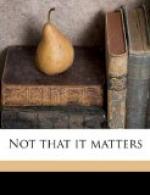After this the game did not trouble me for some time. But there came a day when a friend and I lunched at a restaurant in which chess-boards formed as permanent a part the furniture of the dining tables as the salt and mustard. Partly in joke, because it seemed to be the etiquette of the building, we started a game. We stayed there two hours ... and the fever remained with me for two months. Another year or so of normal development followed. Then I caught influenza and spent dull days in bed. Nothing can be worse for an influenza victim than chess, but I suppose my warders did not realize how much I suffered under the game. Anyhow, I played it all day and dreamed of it all night—a riot of games in which all the people I knew moved diagonally and up and down, took each other, and became queens.
And now I have played again, and am once more an enthusiast. You will agree with me, will you not, that it is a splendid game? People mock at it. They say that it is not such good exercise as cricket or golf. How wrong they are. That it brings the same muscles into play as does cricket I do not claim for it. Each game develops a different set of sinews; but what chess-player who has sat with an extended forefinger on the head of his queen for five minutes, before observing the enemy’s bishop in the distance and bringing back his piece to safety—what chess-player, I say, will deny that the muscles of the hand ridge up like lumps of iron after a month at the best of games? What chess-player who has stretched his arm out in order to open with the Ruy Lopez gambit, who has then withdrawn it as the possibilities of the Don Quixote occur to him, and who has finally, after another forward and backward movement, decided to rely upon the bishop’s declined pawn—what chess-player, I ask, will not affirm that the biceps are elevated by this noblest of pastimes? And, finally, what chess-player, who in making too eagerly the crowning move, has upset with his elbow the victims of the preliminary skirmishing, so that they roll upon the floor--what chess-player, who has to lean down and pick them up, will not be the better for the strain upon his diaphragm? No; say what you will against chess, but do not mock at it for its lack of exercise.
Yet there is this against it. The courtesies of the game are few. I think that this must be why the passion for it leaves me after a month. When at cricket you are bowled first ball, the wicketkeeper can comfort you by murmuring that the light is bad; when at tennis your opponent forces for the dedans and strikes you heavily under the eye, he can shout, “Sorry!” when at golf you reach a bunker in 4 and take 3 to get out, your partner can endear himself by saying, “Hard luck”; but at chess everything that the enemy does to you is deliberate. He cannot say, “Sorry!” as he takes your knight; he does not call it hard luck when your king is surrounded by vultures eager for his death; and though it would be kindly in him to attribute to the bad light the fact that you never noticed his castle leaning against your queen, yet it would be quite against the etiquette of the game.




